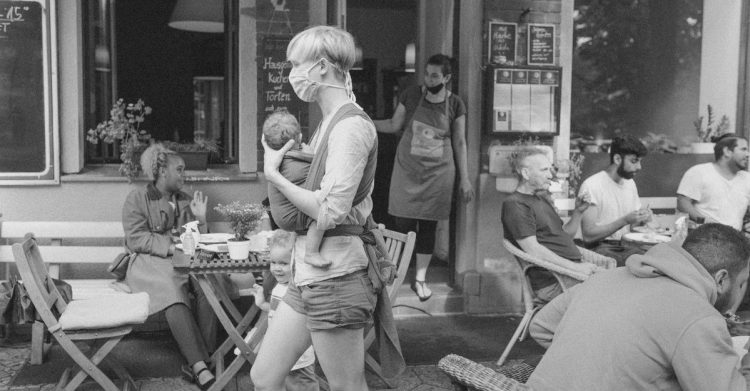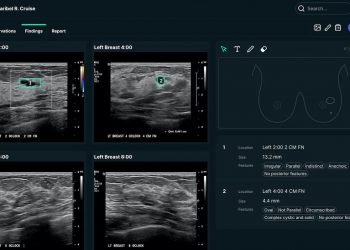Last week, just a couple of hours into a house-sitting stint in Massachusetts for my cousin and his wife, I received from them a flummoxed text: “Dude,” it read. “We are the only people in masks.” Upon arriving at the airport, and then boarding their flight, they’d been shocked to find themselves virtually alone in wearing masks of any kind. On another trip they’d taken to Hawaii in July, they told me, long after coverings became optional on planes, some 80 percent of people on their flight had been masking up. This time, though? “We are like the odd man out.”
Being outside of the current norm “does not bother us,” my cousin’s wife said in another text, despite stares from some of the other passengers. But the about-face my cousin and his wife identified does mark a new phase of the pandemic, even if it’s one that has long been playing out in fits and starts. Months after the vanishing of most masking mandates, mask wearing has been relegated to a sharply shrinking sector of society. It has become, once again, a peculiar thing to do.
“If you notice, no one’s wearing masks,” President Joe Biden declared last month on 60 Minutes. That’s an overstatement, but not by much: According to the COVID States Project, a large-scale national survey on pandemic-mitigation behaviors, the masking rate among Americans bounced between around 50 and 80 percent over the first two years of the pandemic. But since this past winter, it’s been in a slide; the project’s most recent data, collected in September, found that just 29 percent have been wearing masks outside the home. This trend may be long-standing on the population level, but for individuals—and particularly for those who still wear masks, such as my cousin and his wife—it can lead to moments of abrupt self-consciousness. “It feels like it’s something that now needs an explanation,” Fiona Lowenstein, a journalist and COVID long-hauler based in Los Angeles, told me. “It’s like showing up in a weird hat, and you have to explain why you’re wearing it.”
Now that most Americans can access COVID vaccines and treatments that slash the risk of severe disease and death, plenty of people have made informed decisions to relax on masking—and feel totally at ease with their behavior while paying others’ little mind. Some are no longer masking all the time but will do so if it makes others feel more comfortable; others are still navigating new patterns, trying to stay flexible amid fluctuating risk. Saskia Popescu, an infectious-disease epidemiologist at George Mason University, told me that she’s now more likely to doff her mask while dining or working out indoors, but that she leaves it on when she travels. And when she does decide to cover up, she said, she’s “definitely felt like more of an outlier.”
For some, like my cousin and his wife, that shift feels slightly jarring. For others, though, it feels more momentous. High-filtration masks are one of the few measures that can reliably tamp down on infection and transmission across populations, and they’re still embraced by many parents of newborns too young for vaccines, by people who are immunocompromised and those who care for them, and by those who want to minimize their risk of developing long COVID, which can’t be staved off by vaccines and treatments alone. Theresa Chapple-McGruder, a Chicago-area epidemiologist, plans to keep her family masking at least until her baby son is old enough to receive his first COVID shots. In the meantime, though, they’ve certainly been feeling the pressure to conform. “People often tell me, ‘It’s okay, you can take your mask off here,’” Chapple-McGruder told me; teachers at the local elementary school have said similar things to her young daughters. Meghan McCoy, a former doctor in New Hampshire who takes immunosuppressive medications for psoriatic arthritis and has ME/CFS, has also been feeling “the pressure to take the mask off,” she told me—at her kid’s Girl Scout troop meetings, during trips to the eye doctor. “You can feel when you’re the only one doing something,” McCoy said. “It’s noticeable.”
For Chapple-McGruder, McCoy, and plenty of others, the gradual decline in masking creates new challenges. For one thing, the rarer the practice, the tougher it is for still-masking individuals to minimize their exposures. “One-way masking is a lot less effective,” says Gabriel San Emeterio, a social worker at Hunter College who is living with HIV and ME/CFS. And the less common masking gets, the more conspicuous it becomes. “If most people met me, they wouldn’t know I was immunocompromised,” McCoy told me. “There’s no big sign on our foreheads that says ‘this person doesn’t have a functioning immune system.’” But now, she said, “masks have kind of become that sign.”
Aparna Nair, a historian and disability scholar at the University of Oklahoma who has epilepsy, told me that she thinks masks are becoming somewhat analogous to wheelchairs, prosthetics, hearing aids, and her own seizure-alert dog, Charlie: visible tools and technologies that invite compassion, but also skepticism, condescension, and invasive questions. During a recent rideshare, she told me, her driver started ranting that her mask was unnecessary and ineffective—just part of a “conspiracy.” His tone was so angry, Nair said, that she began to be afraid. She tried to make him understand her situation: I’ve been chronically ill for three decades; I’d rather not fall sick; better to be safe than sorry. But she said that her driver seemed unswayed and continued to mutter furiously under his breath for the duration of the ride. Situations of that kind—where she has to litigate her right to wear a mask—have been getting more common, Nair told me.
Masking has been weighed down with symbolic meaning since the start of the pandemic, with some calling it a sign of weakness and others a vehicle for state control. Americans have been violently attacked for wearing masks and also for not wearing them. But for a long time, these tensions were set against the backdrop of majority masking nationwide. Local mask mandates were in place, and most scientific experts wore and championed them in public. With many of those infrastructural supports and signals now gone, masking has rapidly become a minority behavior—and people who are still masking told me that that inversion only makes the tension worse.
San Emeterio, who wears a vented respirator when they travel, recently experienced a round of heckling from a group of men at an airport, who started to stare, laugh, and point. Oh my god, look at what he’s wearing, San Emeterio recalls the strangers saying. “They clearly meant for me to hear it,” San Emeterio told me. “It didn’t make me feel great.” Alex Mawdsley, the 14-year-old son of an immunocompromised physician in Chicago, is one of just a handful of kids at his middle school who are still masking up. Since the start of the academic year, he’s been getting flak from several of his classmates “at least once a week,” he told me: “They’re like ‘You’re not gonna get COVID from me’ and ‘Why are you still wearing that? You don’t need it anymore.’”
Alex’s mother, Emily Landon, told me she’s been shaken by the gawks and leers she now receives for masking. Even prior to the pandemic, and before she was diagnosed with rheumatoid arthritis and began taking immunosuppressive drugs, she considered herself something of a hygiene stan; she always took care to step back from the sneezy and sniffy, and to wipe down tray tables on planes. “And it was never a big deal,” she said.
It hasn’t helped that the donning of masks has been repeatedly linked to chaos and crisis—and their removal, to triumph. Early messaging about vaccines strongly implied that the casting away of masks could be a kind of post-immunization reward. In February, CDC Director Rochelle Walensky described masks as “the scarlet letter of this pandemic.” Two months later, when the administration lifted its requirements for masking on public transportation, passengers on planes ripped off their coverings mid-flight and cheered.
To reclaim a mask-free version of “normalcy,” then, may seem like reverting to a past that was safer, more peaceful. The past few years “have been mentally and emotionally exhausting,” Linda Tropp, a social psychologist at the University of Massachusetts at Amherst, told me. Discarding masks may feel like jettisoning a bad memory, whereas clinging to them reminds people of an experience they desperately want to leave behind. For some members of the maskless majority, feeling like “the normal ones” again could even serve to legitimize insulting, dismissive, or aggressive behavior toward others, says Markus Kemmelmeier, a social psychologist at the University of Nevada at Reno.
It’s unclear how the masking discourse might evolve from here. Kemmelmeier told me he’s optimistic that the vitriol will fade as people settle into a new chapter of their coexistence with COVID. Many others, though, aren’t so hopeful, given the way the situation has unfolded thus far. “There’s this feeling of being left behind while everyone else moves on,” Lowenstein, the Los Angeles journalist and long-hauler, told me. Lowenstein and others are now missing out on opportunities, they told me, that others are easily reintegrating back into their lives: social gatherings, doctor’s appointments, trips to visit family they haven’t seen in months or more than a year. “I’d feel like I could go on longer this way,” Lowenstein said, if more of society were in it together.
Americans’ fraught relationship with masks “didn’t have to be like this,” Tropp told me—perhaps if the country had avoided politicizing the practice early on, perhaps if there had been more emphasis on collective acts of good. Other parts of the world, certainly, have weathered shifting masking norms with less strife. A couple of weeks ago, my mother got in touch with me from one such place: Taiwan, where she grew up. Masking was still quite common in public spaces, she told me in a text message, even where it wasn’t mandated. When I asked her why, she seemed almost surprised: Why not?
Source by www.theatlantic.com











